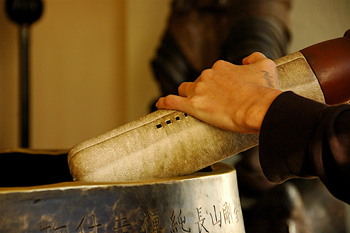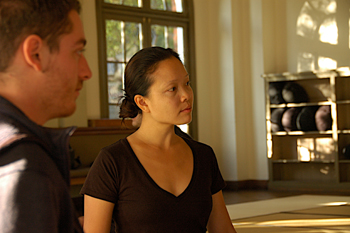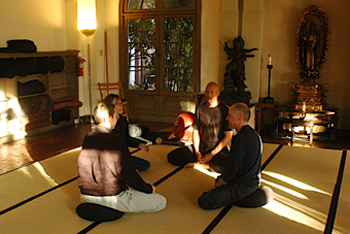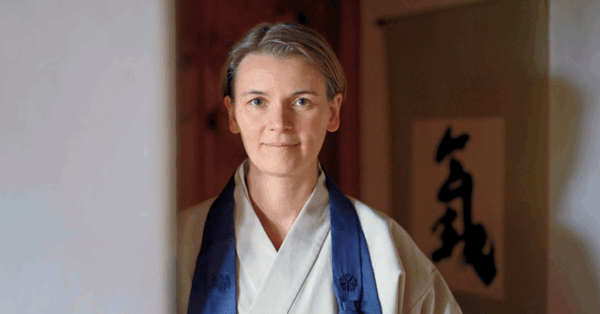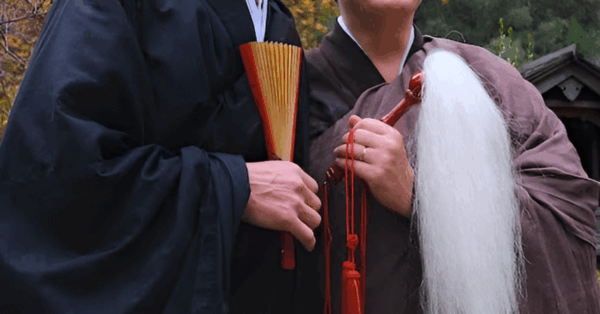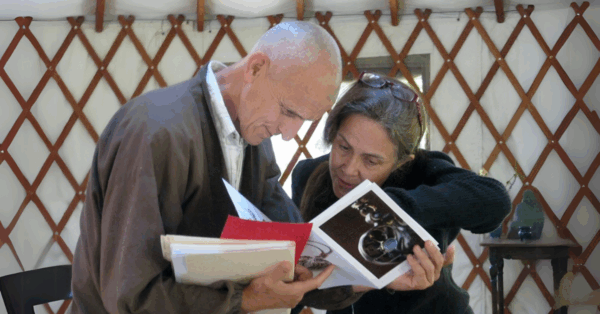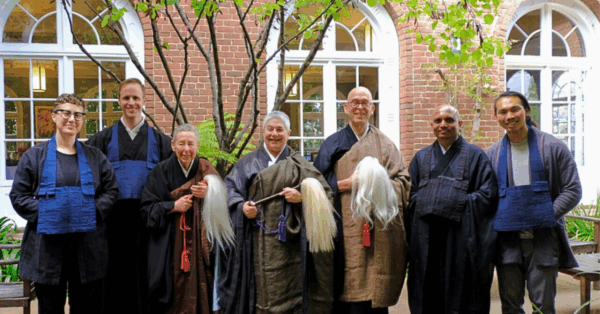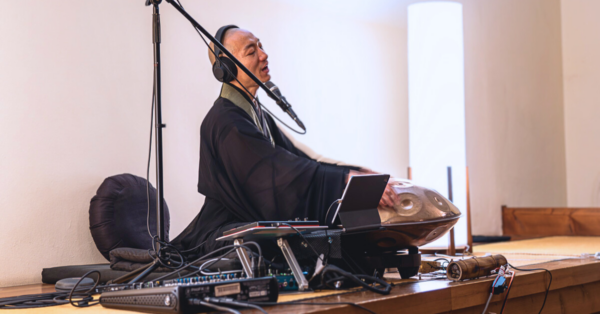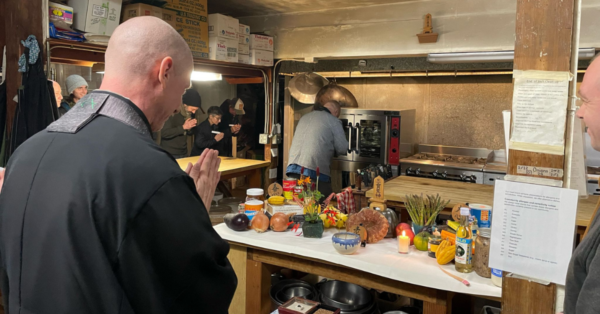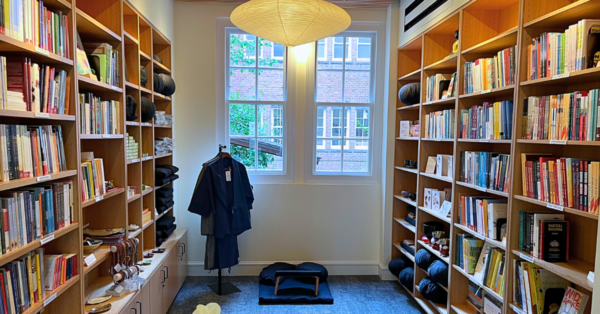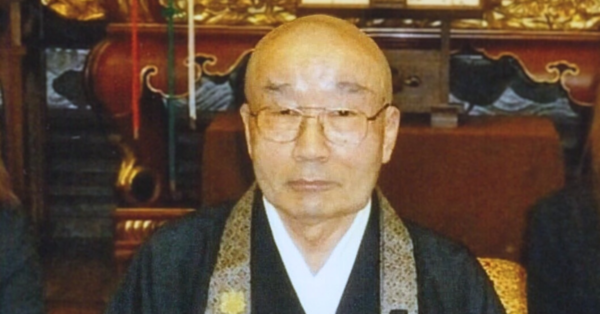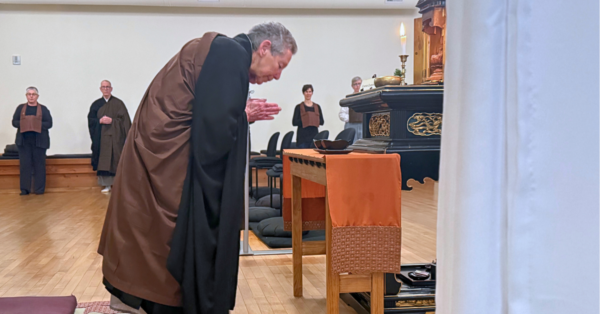An Interview with Ryushin Paul Haller and KiKÅ«Â Christina Lehnherr (2013)
Establishing the Path of Practice (EPP) has served as a gateway for hundreds of people who have wanted to establish a Zen practice in their lives, just as they live it. Registration is now underway for its 2016 program, which offers practitioners a road map for the cultivation of Zen practice within the demands and uncertainties of their daily lives.
Article by Sachico Ohanks
Photos by Florian Brody
The well-established curriculum for this program interweaves zazen meditation, yoga, sensing, discussion, lecture and mindfulness activities throughout. The teachers provide a rich and intimate environment in which to cultivate a daily Zen practice, and fellow students provide a supportive sangha (community).
In late December, I had the opportunity to talk with the EPP lead teachers Senior Dharma Teacher Ryushin Paul Haller and City Center Abiding Abbess KiKÅ« Christina Lehnherr:
SFZC: Who comes to EPP?
Christina Lehnherr:Â People come from many different places. Some have been sitting for many years, but felt they have never been able to establish a continuous sitting practice. There are people who come completely new; they have no experience of any kind with this practice or with zazen. Also, age wise, we have young people, and we have people in their 70s who come.
Paul Haller: Some people come because they like the support of a defined structure. With EPP they have a structure that they can follow, and they have guidance and support to do this. Others come because of the particular way that the program is designed. In the first trimester, we develop the skills of awareness. Second trimester, we use them to become aware of who we are and how we are. Third trimester, we bring the values, principles, ideals, aspirations that arise from practice, to our relationships – intimate relationships, familial relationships, work relationships. Of course, in one year we cannot fully resolve all of our personal issues. But if we start down the path of practice, then we will continue to develop the ability to meet the challenges that arise in our lives.
SFZC: What are the challenges that your students grapple with?
Christina Lehnherr:Â One of the biggest challenges is to actually create, in their everyday lives, a continuous available space in which to sit down and meditate for half an hour every day. That is often what people struggle with for a long time – when to sit, how to sit, and how to let go of the other things they want to do instead.
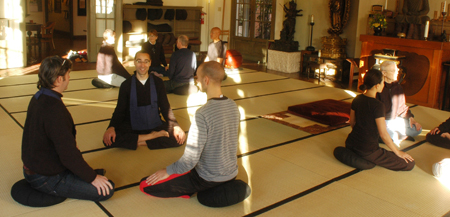 Paul Haller: We have found that for people who are just starting, they don’t actually need more information or persuasion with regards to the value of zazen. What they need is the support to begin practicing zazen regularly and to live Zen values. The mindfulness exercises, the support in the group meetings, the contact with the teachers – all help them take their sitting practice and bring it into a mindfulness practice in their lives. And then for those who come with some experience in practice, the program is about a deeper integration of both a regular zazen practice and bringing mindfulness into the activities of their lives.
Paul Haller: We have found that for people who are just starting, they don’t actually need more information or persuasion with regards to the value of zazen. What they need is the support to begin practicing zazen regularly and to live Zen values. The mindfulness exercises, the support in the group meetings, the contact with the teachers – all help them take their sitting practice and bring it into a mindfulness practice in their lives. And then for those who come with some experience in practice, the program is about a deeper integration of both a regular zazen practice and bringing mindfulness into the activities of their lives.
Christina Lehnherr: Another big challenge we all struggle with when we practice are our habits – our habitual ways of being, thinking, feeling and behaving. So, we offer exercises that help the participants be in the present, which means they have to let go of their habitual patterns. For example, paying attention to the sequence of getting dressed – what do you put on first, which leg first, which arm first, or which garment first? What is the sequence? Notice what you are doing. Then change it. Start from the top or the other leg, because that helps you be more present.
Paul Haller: To make the act of dressing deliberately conscious is a way to both shift out of the unexamined physical habit but also out of the unexamined mental-emotional disposition. Some exercises will start to reveal details of our personality. We become aware of our psychological traits – like what kind of experiences trigger us to become self-critical, or what kind of emotions do we tend to have under these sorts of circumstances. And then the marvelous thing about awareness is that as we bring awareness to the details of our lives, it creates the possibility of a more intentional response. Once we get the information about our habitual responses, it stimulates our capacity to accept them, to adjust to them, and to factor them into how we respond to circumstances.
A lot of our preoccupation, agitation and burden are with inner conflicts. The more we become aware of them, become skillful and adaptive in relationship to them, the more we free up our energy for a more purposeful engagement both in our own life but also in our relationships.
SFZC: What changes do you see in your students?
Christina Lehnherr: One of the biggest changes is how people report about the experience they are having. At first they describe their experiences in their habitual way. As if, they are removed from what they are describing. And over the course of the program, starting at the end of the first term and becoming really apparent in the second and even more in the third term, they speak from inside the experience. This can awaken many thoughts and feelings, but in some ways if you are really present for the experience, even if it is painful, there is something happy about it. There is something happy about being so in touch with what is actually going on, which disregards whether it is joyful or painful or frustrating or confusing. There is a peaceful quality – very quiet and compelling. The more you get into that place, the more you want to get in that place. You don’t care so much anymore if it is a pleasant or unpleasant experience.
Paul Haller: One of the primary notions of practice is that awareness will have a positive effect on your life. Each person will tend to how and where this positive effect becomes most real for them. It’s wonderful for us to witness. One person will find an aspect of practice exercise really helpful and another will find a different aspect of the same exercise really helpful – each guided by their own psychology to attend to their experience in a way that reveals liberation. Each student finds some relevance in relationship to each facet of the program, and in general most students, who continue through the whole year, do find that something has been integrated into how they live now, how they think now, and who they are.
SFZC: In your opinion what’s great about the program?
Christina Lehnherr: I think the peer groups, because some of them still meet to this day. They still practice together, they use the tools they learned like how to talk with no cross talk, and they support one another to continue their practice. So, there are mini sanghas spread around. Another important quality is that the program is completely experiential. We want people to physically become able to sit and be mindful and not distracted. So we don’t do a lot of Buddhist teaching. For that they can go to classes or read books. Paul does yoga stretching and I do sensing exercises. We work in dyads and triads, developing listening skills – deep listening and not meddling or thinking you have to fix something.
Paul Haller: Now we have so much access to so much teaching about spiritual practice. There is an abundance of wonderful advice, sayings, and teachings available to us. The challenge is integrating this wisdom into our lived activity. This program offers a variety of ways to enable that integration. I think many people wish to bring awareness to their everyday lives, rather than give up their usual lives in order to do Zen practice. In many ways this wish is in contrast to the classic formula of giving up secular life for spiritual life. We take the essence of Zen practice and bring it into our busy lives. This notion carries the flavor of Buddhism in the West, which is less about people renouncing their lives and becoming monks and nuns, and more about people saying okay, we are going to live our lives and practice Zen.
This integration of Zen practice with everyday life seems to be a common feature in the West. And, it creates exciting possibilities. If we do this, individually and collectively, our society will be profoundly affected in a positive way. What an extraordinary gift it will be for all of us.
SFZC: What do you want most to give your students?
Paul Haller:Â What I would hope for is for them to discover what it is to bring awareness, mindfulness, into the different aspects of their being, and to do so with consistency.
Christina Lehnherr: I want to give them the opportunity to become really interested in their own lives. That they get a taste of how incredibly, inconceivably… awesome it is that we are alive. And, how life lives itself, beyond the little box that we create of what we think we are, what we can or cannot do, what the world is going to be like, and how we have to manage it to be safe. Beyond all that, life just keeps flowing and expressing itself. I would like for my students to get a little taste of that and to become curious about what it is to live life from inside out, rather than from outside trying to control it all. That would be what makes me happy.
EPP 2016 will be led by Ryushin Paul Haller and fellow Zen teachers. The 12-week non-residential program begins on  September 24, 2016, at City Center (apply by September 9).


